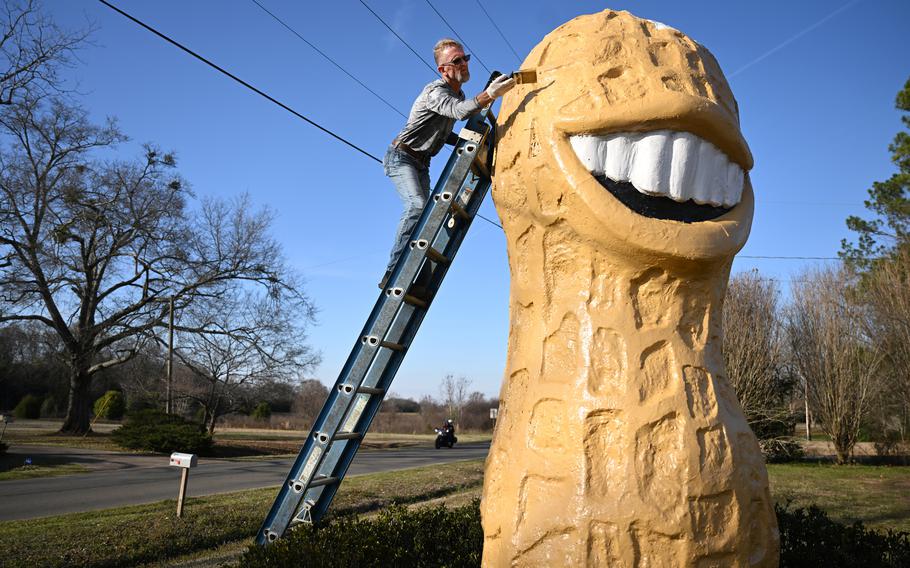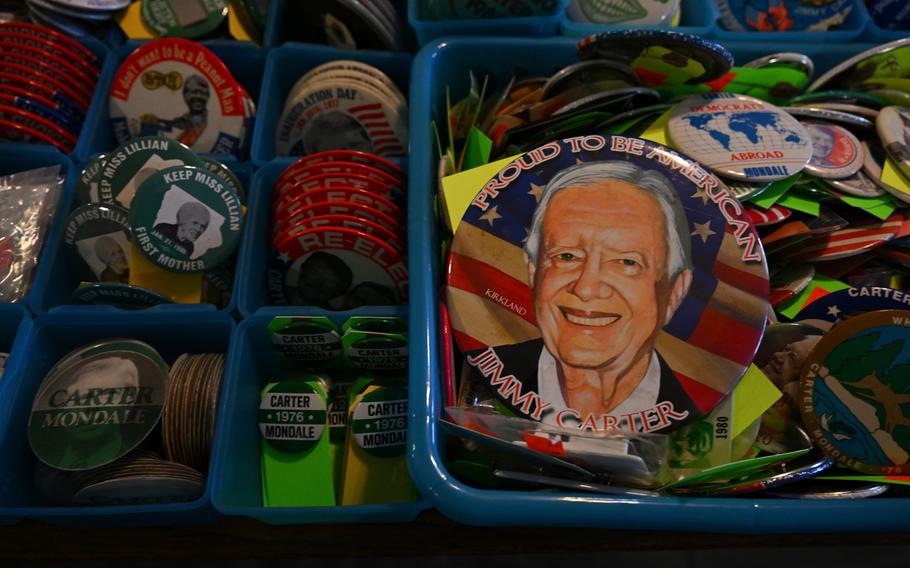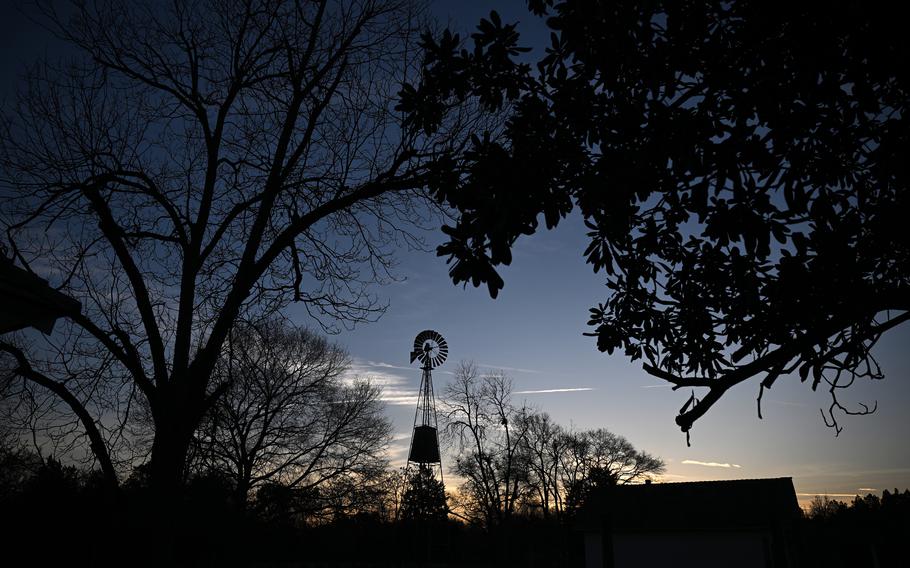U.S.
Jimmy Carter’s tiny hometown prepares to say goodbye
Stars and Stripes February 21, 2023

Michael Dominick paints the Smiling Peanut on Sunday in Plains, Ga. The peanut was presented to Jimmy Carter during a campaign event in Evansville, Ind., in 1976. (Matt McClain/The Washington Post)
PLAINS, Ga. — Michael Dominick had put off touching up the 13-foot peanut.
Every three years for the last 20, Jimmy Carter’s hometown hired the handyman-slash-mail carrier to repaint the roadside statue, a relic from the former president’s 1976 campaign. Now the peanut’s toothy grin, a nod to Carter’s famously wide smile, needed a polish.
But it had been raining lately in Plains, a patch of farmland home to roughly 700 people, so Dominick, 54, hadn’t been in a hurry. Then word broke Saturday that Carter, the oldest ex-president at 98, had opted to spend his final days in hospice care at home.
“I could barely sit through church the next day,” said Dominick, who’d rushed out to find a bucket of automotive paint in a shade called “peanut.”
Restoring the monument near the Baptist church where Carter taught religious classes took him five hours Sunday instead of the usual seven. Mourners and news crews from around the globe, he knew, would soon be descending on their humble slice of southwest Georgia, and Carter’s example had taught him to represent it with pride.
The 39th president, a Democrat who served one term from 1977 to 1981, could have moved anywhere after leaving the White House. He could have cashed in on six-figure speaking gigs, among other private-sector opportunities that have piled wealth on his successors. Yet the onetime peanut farmer and engineer chose instead to embrace his modest roots, making him all the more beloved in Plains and all the harder to lose.
To the rest of the world, he’s President Carter — the Nobel Peace Prize laureate who rocketed to unexpected political heights, installed the first solar panels on the White House, brokered a peace deal between Egypt and Israel, slammed into controversy with gas shortages and the Iran hostage crisis and lost his reelection race to Ronald Reagan before launching decades of humanitarian work.
To everyone in Plains, he’s “Mr. Jimmy.”

Buttons featuring former president Jimmy Carter are seen at the Plains Trading Post on Feb, 20, 2023, in Plains, Ga. (Matt McClain/The Washington Post)
Forty-two years after his political retirement, the Carter mania here hasn’t waned. A red, white and blue banner greets visitors on Main Street: HOME OF JIMMY CARTER. The general store below it sells peanut ice cream, celebrating Carter’s agricultural background. Admirers cram into his former campaign headquarters, a defunct railroad depot turned tiny museum. Just last month, the former leader whizzed past it in the back of a Secret Service-steered golf cart.
“I don’t know any life without him,” said his niece, LeAnne Smith, 61, a retired middle school teacher. Smith, the daughter of former first lady Rosalynn Carter’s brother, had been crying in bursts since she got the call days ago from another family member.
She tried to compose herself before heading into a Presidents Day event Monday at Carter’s old high school, where she’d attended first and second grade. Normally, this holiday was far more jovial for the people of Plains.
“It’s just hard sitting and waiting,” she said, tears streaking her cheeks. “You just want it to be peaceful.”
Carter had been in and out of the hospital a lot, she said. He had survived a variety of health problems in recent years, including a 2015 battle with melanoma that had spread to his liver and brain. The prognosis had been grim, but after four months of treatment, the former president defied tough odds to emerge cancer-free.
Smith wasn’t sure what had prompted Carter to prepare for the end of his life. The Carter Center’s weekend announcement lacked those details. Her family, she said, completely supported his choice.
What he wanted now, Smith said, was to rest at the ranch house he built six decades ago with Rosalynn. That house on Woodland Drive hasn’t changed much over the years, as far as she could tell; Smith visited over the weekend with plates of butter beans and corn muffins. The mood was calm, she said. Carter was asleep, but, his children told her, he was still eating.
Years ago, the former president declared he’d be buried in his front yard.
“It’s just so typical of Uncle Jimmy,” Smith said. “It’s home. He could be buried anywhere. He could have lived anywhere. He came back to Plains.”
Inside the high school’s auditorium was Larry Cook, a presidential historian and a longtime friend of the Carters, who greeted Smith with a hug. She settled into a wooden chair to watch his annual Presidents’ Day talk.
“We’re remembering the good times,” Cook said, setting up a table of Carter memorabilia. “We’re all sitting around talking and we’re smiling and we’re laughing and we’re crying a little bit.”
Every February for the past dozen, Cook had traveled to Plains from his home in Pennsylvania to share little-known facts about past American leaders. He specialized in their personal lives. Carter, though, had become part of his. The men talked for hours over Coke Zeros.
“To the world, he’s a former president,” he told the somber crowd. “To many of us in this auditorium, he’s our friend. He’s our family. He’s a neighbor.”
Carter cherished his time in this red-brick building, Cook said. The former president had quoted only two people in his 1977 inaugural address: The biblical prophet Micah — and his favorite teacher at Plains High School, Julia Coleman. (According to him, she used to say: “We must adjust to changing times and still hold to unchanging principles.”)

The Jimmy Carter Boyhood Farm, where Carter grew up, in Plains, Ga. (Matt McClain/The Washington Post)
Jill Stuckey, superintendent of the National Park Service in Plains, watched from the back of the room. With Carter’s guidance, the Park Service had restored the farm where he was raised — a place he spoke of milking cows, feeding hogs and pretending that corn cobs were swords.
“The town means everything to Jimmy,” she said, “and Jimmy means everything to the town.”
Recently, Carter asked Secret Service agents to bring him back for a tour. He picked up some eggs from the chicken coop, just as he’d done as a boy. The family had lacked electricity and running water until he was 11.
Carter and Rosalynn, who met here when they were children, had never shown interest in flashiness, Stuckey said.
“They don’t crave the niceties of life like most of us mere mortals,” she said. “They are satisfied with the same bathroom, the same kitchen, the same living room and the same furniture that they have had since 1961.”
Down the road, Philip Kurland, 71, a co-owner of a political memorabilia and collectibles shop, reflected on the legacy of a former world leader who didn’t demand to be treated like royalty.
Rather, people here said, Carter made them feel special. He asked questions and listened. Surrounded by Carter posters, magnets and vintage campaign signs, Kurland recalled the time he got so sick that he landed in the intensive care unit with an abscess in his lung.
When the shoprunner was well enough to rest at his apartment above the shop, Kurland’s wife told him someone wanted to see him. To his surprise, it was Carter.
“He sat with me for an hour,” Kurland said. “He made it all about me. The Secret Service had to wait downstairs.”
During the pandemic, the Carters, known to hold hands on public strolls, ventured out rarely. The ex-president’s health update set off collective grieving.
“Sometimes reality is not something you really want to be happening,” said Jan Williams, 73, who has known Carter for five decades and taught his daughter, Amy, in fourth grade. “It’s a reality now that he is closer than ever to leaving us, and it’s going to be a great void in the people of Plains.”
Her husband, who has known Carter since they were both boys, is too emotional to even speak, she said.
“There’ll never be another one like him,” she said.
Chelsea Williams, 26, a housekeeper at the Windsor hotel in nearby Americus, grew up next to Carter’s family farm and met the former president when she was six. Her family called him “Mr. Jimmy.”
“I remember thinking, ‘Oh, this is just a normal guy,’” she said. “Then later on, I was like, ‘Oh crap! I met a president!’”
She was tidying rooms, including a presidential suite named after Carter, when practically everyone around her started discussing his mortality.
She comforted herself with the words that have become a mantra around town.
“He lived a long life,” she said. “He lived a long and happy life.”
Jordan reported from Washington. The Washington Post’s Matt McClain in Plains contributed to this report.